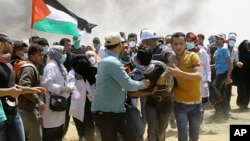A U.S.-based Iranian dissident has criticized Iran’s harsh reaction to the opening of the U.S. embassy in Jerusalem and Israel’s killings of Palestinian rioters along the Gaza-Israel border.
Speaking on the Monday edition of VOA Persian’s NewsHour program, Indiana University of Pennsylvania doctoral candidate Reza Parchizadeh accused Tehran of trying to divert attention from its domestic problems by trumpeting criticisms of the U.S. and Israeli governments. “The Islamic Republic of Iran specializes in deflecting its problems to external actors,” he said.
In a Monday tweet, Iranian Foreign Minister Mohammad Javad Zarif alleged that Israel “massacred countless Palestinians in cold blood” in the day’s violence on the Gaza-Israel border. Israel said its forces acted appropriately in responding to assaults on the border fence. Zarif also called Monday’s inauguration of the U.S. embassy in Jerusalem “illegal” and accused unidentified Arab nations of being “collaborators” with Washington.
Iran’s Revolutionary Guard Cops also issued a statement through its Tasnim news agency, calling for a “new wave of anti-U.S. movements” and a “new wave of rage” in the region and beyond, against those who support what it called the "shameful" U.S. embassy move.
Iran’s Islamist leaders have faced one of the biggest challenges to their rule in years from anti-government protests that have swept the country since December. Most protests have drawn dozens to hundreds of people.
Parchizadeh, a political theorist, said Tehran’s verbal attacks on the U.S. and Israel also are rooted in the ideology of its ruling clerics, who refer to the U.S. as a “Great Satan” and call for Israel’s eradication. He said the only way for the world to stop Iran from using such language is to change its Islamist leadership.
Another Iranian dissident who appeared on VOA Persian’s NewsHour show, London-based Alireza Nourizadeh, also accused Iran of taking advantage of the Israeli-Palestinian conflict, saying it will use “any means” to prevent peace from being achieved. But, he also criticized the U.S. embassy opening in Jerusalem, saying it has created a bad atmosphere in the region.
“America’s closest Arab allies such as Saudi Arabia have been advocating a peace process with Israel, but they have criticized the embassy move (as unhelpful to that process),” Nourizadeh said. He said those Arab nations have been left wondering how to justify the Israel policy of their U.S. ally.
“That is why I sincerely believe that the Trump administration should come up with a genuine peace initiative for the region,” Nourizadeh said.
Iranian-Israeli journalist and Tehran critic Menashe Amir told NewsHour that he had heard from an informant that the Iranian government is sending money to Gaza to support anti-Israel protests there.
Amir, who is based near Jerusalem, said the deaths of Palestinians in Monday’s riots along the Gaza-Israel border pain him. “They are human beings and have rights, too,” he said. But, Amir said the blame for the violence should be placed on the Hamas militant group that rules Gaza and on its sponsor, Iran.
“Israel has no other choice but to defend itself,” Amir said. “No country in the world would allow people who chant for its death to enter its soil and commit an aggression.”
Hamas has blamed Israel for Monday’s violence, part of series of protests it has organized in recent months near the border fence with Israel to promote its goal of “returning” its people to Israeli territory.
But in a Monday press briefing, White House spokesman Raj Shah sided with Israel, saying Hamas is responsible for the “entire situation."
This report was produced in collaboration with VOA’s Persian Service.




